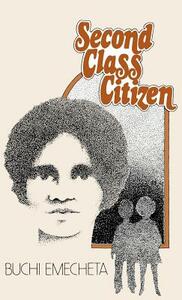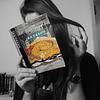Take a photo of a barcode or cover
I picked up a copy of this book because of my regularly refreshed familiarity with the contents of [b:500 Great Books By Women|1503057|500 Great Books By Women|Erica Bauermeister|https://images.gr-assets.com/books/1438987789s/1503057.jpg|1494514]. I have also seen Emecheta's name crop up in other officiated channels, and the generally positive reviews reassured me that this particular acting on a whim had a good chance of being worth it. However, I'm not longer at the stage where I need a bare bones anthropology narrative regarding a mid 20th century Nigerian's time in jolly old England, and Emechta's story, however tortuous, built up to a certain degree, stagnated, and then ended on a veritable cliffhanger where a reader couldn't really believe anything would change. I've read and found magnificent other crushing narratives, but those always had an extra bit of something to them, whether rhetorical oomph or gripping imagery, and this, barring a few surreal runs of events three quarters of the way in and just before the end, never really got past an almost dry litany of a person's life and choices and resulting misfortunes, albeit in a combination of character and country that I don't encounter much in my reading. For whatever reason, I was not inspired, and whether this is due to my own cynicism or understanding that such enthusiasm does little good in the long run remains to be seen.
The best part of this work was when Adah was a gangling child wrangling with life and death and education until she had the means the vision of her future to seeming fruition. Once her penultimate goal of expatriation was achieved, all of that went and stayed downhill for pretty much the rest of the narrative. While there was a brief burst of interesting material near the end, especially with the mentions of Nwapa and Baldwin, it was a story I'd heard before in a less than novel guise, and it grew onerous, despite the text's brevity, to continue on for so long in predictably agonizing circumstances. As said previously, it all ends so abruptly that one isn't left with much, if any, sense of closure, and with a narrative this short, it's almost vital to have something of that sort before moving on. Longer narratives can sometimes both benefit and suffer from a reader waiting for it to be over, but a novella is best as a brief yet pithy punctuation mark, and this dragged and then barely gave any sense of follow through. I understand that this is autobiographical, but I still feel I've read this narrative elsewhere in a more engaging format, and there are no quotes or notable events that bubble to mind to convince me otherwise.
This wasn't the most fortuitously spontaneous 500 GBBW pick up, but I've had too many rewarding experiences with the directory to start hesitating now. Not everyone's going to have my above average (for an Anglo White who's never stepped outside the US, at least) experience with Nigerian/postcolonial expatriation narratives, and so their introduction will not have so many previous remembrances dangling in the background. As such, this is not the book for me, but it has a good chance of being the book for other,s so I will be glad to send it on its way to a possibly fortunate college student (my copy has a used textbook sticker on its spine). Looking back at the year thus far, I've either rounded or am rapidly approaching the curve of halfway through my challenge reads, and I'm looking forward to engaging with two group reads next month that happen to be concerned with two as of yet so far unread challenge books. For now, though, I have another book selection to ferret out that, hopefully, will make for an experience that fits in better with its rave reviews.
The best part of this work was when Adah was a gangling child wrangling with life and death and education until she had the means the vision of her future to seeming fruition. Once her penultimate goal of expatriation was achieved, all of that went and stayed downhill for pretty much the rest of the narrative. While there was a brief burst of interesting material near the end, especially with the mentions of Nwapa and Baldwin, it was a story I'd heard before in a less than novel guise, and it grew onerous, despite the text's brevity, to continue on for so long in predictably agonizing circumstances. As said previously, it all ends so abruptly that one isn't left with much, if any, sense of closure, and with a narrative this short, it's almost vital to have something of that sort before moving on. Longer narratives can sometimes both benefit and suffer from a reader waiting for it to be over, but a novella is best as a brief yet pithy punctuation mark, and this dragged and then barely gave any sense of follow through. I understand that this is autobiographical, but I still feel I've read this narrative elsewhere in a more engaging format, and there are no quotes or notable events that bubble to mind to convince me otherwise.
This wasn't the most fortuitously spontaneous 500 GBBW pick up, but I've had too many rewarding experiences with the directory to start hesitating now. Not everyone's going to have my above average (for an Anglo White who's never stepped outside the US, at least) experience with Nigerian/postcolonial expatriation narratives, and so their introduction will not have so many previous remembrances dangling in the background. As such, this is not the book for me, but it has a good chance of being the book for other,s so I will be glad to send it on its way to a possibly fortunate college student (my copy has a used textbook sticker on its spine). Looking back at the year thus far, I've either rounded or am rapidly approaching the curve of halfway through my challenge reads, and I'm looking forward to engaging with two group reads next month that happen to be concerned with two as of yet so far unread challenge books. For now, though, I have another book selection to ferret out that, hopefully, will make for an experience that fits in better with its rave reviews.
This book reminds me of A Tree Grows in Brooklyn by Betty Smith and The Awakening by Kate Chopin except from the perspective of an awakening African immigrant woman in London. A little slow to start but eventually very powerful. The ending isn't typically happy, but Adah was such a strong, perseverant, intelligent woman that there's just no chance she didn't eventually achieve her dreams and see her dreams for her children achieved.
Wow, Buchi Emecheta tells a powerful story. Her writing style is so interesting; it's clear that English is her second language but her command of the language and her ability to pace her work is amazing, as is the way she describes the most important aspects of scenes to vividly portray her protagonist's emotions. I understand that many of her novels are based loosely on her life. I plan to read the entire oeuvre.
I wish there had been a little more to the ending, but I really really enjoyed the rest.
challenging
dark
emotional
hopeful
inspiring
sad
tense
Plot or Character Driven:
A mix
Strong character development:
Yes
Loveable characters:
Complicated
dark
emotional
inspiring
reflective
fast-paced
Plot or Character Driven:
Character
Strong character development:
Yes
Loveable characters:
Complicated
Diverse cast of characters:
Yes
Flaws of characters a main focus:
Yes
La historia realmente es muy interesante y muy complicada por momentos.
Mi valoración tiene que ver con el ritmo que tiene el libro.
Mi valoración tiene que ver con el ritmo que tiene el libro.





